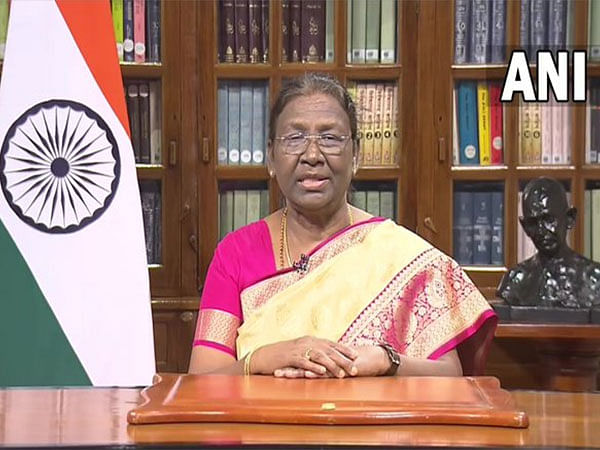


In a special event held at the Rashtrapati Bhavan, President Droupadi Murmu paid tribute and recognized the crucial contributions of 15 women members of the Indian Constituent Assembly in shaping the country's constitutional framework. During her address, President Murmu highlighted the significant impact of these women in ensuring gender equality and representation in the democratic process, and their tireless efforts in making the Constitution inclusive and progressive. This event serves as a powerful reminder of the remarkable women who have played a pivotal role in shaping the destiny of India.
Recognising the Contributions of Women in India's Constitutional Framework
Introduction
On a historic occasion at the Rashtrapati Bhavan, President Droupadi Murmu acknowledged the pivotal role played by 15 women members of the Indian Constituent Assembly in drafting the nation's constitutional framework. Their efforts, spanning from ensuring gender equality to making the Constitution inclusive, have left an enduring impact on India's democratic process.
Background
The Indian Constituent Assembly, established in 1946, was responsible for drafting the Constitution of India. Among its 389 members were 15 women, a testament to the recognition of women's rights and leadership during India's independence movement.
These remarkable women included:
Contributions of Women Constituent Assembly Members
The women of the Constituent Assembly made significant contributions in the following areas:
President Murmu's Tribute
In her address, President Murmu commended the visionary leadership and determination of these women. She emphasized the importance of their contributions in shaping a just and equitable society for all Indians.
Top 5 FAQs and Answers
Q1: Who was the first female President of India?
A1: Pratibha Patil, who served from 2007 to 2012.
Q2: How many women were there in the Indian Constituent Assembly?
A2: 15
Q3: What was the significance of the women's contributions to the Constitution?
A3: They ensured gender equality, promoted social justice, and made the Constitution inclusive and progressive.
Q4: What challenges did the women Constituent Assembly members face?
A4: They faced societal prejudice, lack of formal education, and limited representation in decision-making roles.
Q5: How can we continue to honor the legacy of these remarkable women?
A5: By promoting gender equality, empowering women in leadership roles, and advocating for a just and inclusive society.
Conclusion
The recognition of the 15 women Constituent Assembly members by President Murmu is a testament to their pioneering efforts in shaping India's constitutional framework. Their contributions continue to inspire generations and remind us of the importance of gender equality and inclusivity in building a better future for all.

Prime Minister Narendra Modi made a surprise visit to INS Vikrant, India's flagship aircraft carrier, on Diwali eve 2025. This marked his first visit to the high seas to celebrate with the Navy personnel stationed there. His visit included cultural activities, a yoga session, and an inspiring address to the naval staff, further strengthening the bond between the leader and the armed forces.

Prime Minister Narendra Modi celebrated Diwali with the Indian Navy on the INS Vikrant aircraft carrier stationed off the coast of Goa and Karwar. The cultural programme organized by the Navy was described by PM Modi as an unforgettable experience. He also praised the dedication and creativity of the naval personnel and highlighted the success of the armed forces in Operation Sindoor with a patriotic song "The Vow of Sindoor". In addition, PM Modi also addressed the country's security forces and lauded their efforts in combating Naxalism.

In a powerful Diwali speech on board INS Vikrant, Prime Minister Narendra Modi lauded the coordination of India's armed forces in Operation Sindoor, which led to a swift surrender by Pakistan. He also emphasized the importance of self-reliance in strengthening the armed forces and highlighted India's progress in manufacturing essential military equipment domestically. He further announced India's goal to become a top defence exporter, with a significant increase in defence exports in the last decade.

Prime Minister Narendra Modi continued his tradition of celebrating Diwali with India's armed forces by visiting the INS Vikrant off the coast of Goa and Karwar. He praised the Navy personnel for their dedication towards the security of the nation and expressed his gratitude to the families of the brave soldiers. PM Modi also witnessed an impressive display of precision and prowess during an Air Power Demo on INS Vikrant, showcasing the technological excellence of the Indian Navy.

Prime Minister Narendra Modi celebrated Diwali 2025 with Indian Navy personnel aboard the indigenous aircraft carrier INS Vikrant, highlighting the ship's strength and psychological impact on adversaries. Commissioned in 2022, the carrier is a symbol of India's self-reliance and strategic resolve. PM Modi praised the bravery and dedication of the naval personnel, reinforcing the bond between the armed forces and the government.

The Allahabad High Court has directed the Jailer of Hisar Central Jail in Haryana to provide an explanation on how self-styled Godman Sant Rampal, currently held in the jail, is able to write and distribute books that allegedly target Hindu deities. This comes after a plea was filed by Hindu Front for Justice, calling for a ban on the books and action against Rampal. The petition alleges that the books contain offensive and provocative language and have been distributed through electronic communication platforms, causing disharmony between religious communities.

Following the latest string of scandals involving Prince Andrew, King Charles was photographed attending a Sunday morning service near his Scottish estate. The King wore a solemn expression as he drove to Crathie Kirk, displaying tension amidst a tumultuous time for the royal family. Recently, Prince Andrew announced his resignation from the Duke of York and membership of the Order of the Garter, the oldest chivalric order in the UK.

The nation's political leaders, including Prime Minister Modi, President Murmu, and Union Minister Amit Shah, took to social media to extend their warm wishes to the country on the occasion of Diwali. They highlighted the significance of the festival and urged people to celebrate it responsibly and with mutual love and harmony. EAM Jaishankar also wished everyone a happy and prosperous Diwali.

GB News journalist Nana Akua and royal fans are calling for King Charles to follow in Prince Andrew's footsteps and strip Prince Harry and Meghan Markle of their royal titles. This comes after the Duke of York voluntarily gave up his titles in light of the ongoing scrutiny surrounding his association with Jeffrey Epstein. Nana Akua ridiculed Meghan Markle's business ventures and urged the King to take away her Duchess of Sussex title in order to prevent her from setting foot in the UK again.

During a speech for Deepotsav 2025 celebrations in Ayodhya, Uttar Pradesh Chief Minister Yogi Adityanath criticized the opposition for denying Lord Ram's existence and obstructing the Ram Janmabhoomi Temple movement. He specifically called out the Congress for submitting an affidavit to the Supreme Court calling Lord Ram a myth and accused the Samajwadi Party of firing bullets at Ram devotees. Adityanath also emphasized the determination and resilience of the movement, which began in 1949 with the resolution "Ram Lalla Hum aayenge, Mandir wahin banayenge" and continues to this day.